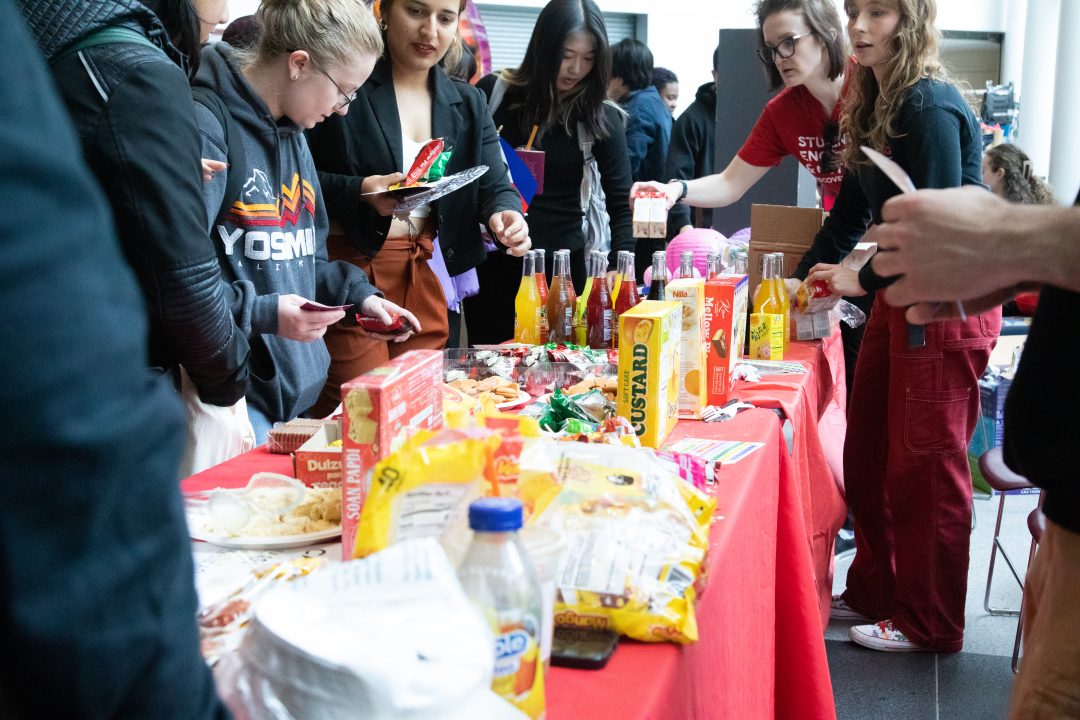
Wiam Homir, a sophomore chemical engineering major from Morocco, cried and trembled on the phone with her parents after she learned that she might not be able to stay in the U.S. to complete her education.
The Immigration and Customs Enforcement (ICE) announced new changes to the Student and Exchange Visitor Program (SEVP) on July 6, under a directive from the Trump administration. The changes, which were rolled back on July 14, would have forced students to leave their university if they did not take any classes in-person.
“I was, and still am, very stressed because of the situation,” Homir said. “I have been preparing to study abroad in the U.S. for so long — learning the [English] language, going through a torturing amount of studying, without mentioning the emotional and financial hassle that accompanies it.”
International students attending Harvard University, which will hold all classes online next year, would have been forced to either transfer or be deported.
Harvard released a statement supporting international students on July 8 and then, along with the Massachusetts Institute of Technology, filed suit against the Trump administration. The schools argue that the new guidance did not consider the global pandemic’s effects on international students and the “immediate and severe impact” of the rule change. The lawsuit also contends that the changes reflect an effort from the federal government to force universities to reopen in-person classes, aligning with the recent Trump administration’s push to reopen public schools in the fall, even as coronavirus (COVID-19) cases begin to spike again.
They also argue that it violates the Administrative Procedures Act, which requires federal agencies to provide opportunity for public notice, comment and reasoned explanations for their decision making. ICE did not offer a reason for the change, but an agency spokeswoman said officials from the U.S. Customs and Border Protection and the Department of State had developed the plan, according to an article by Reuters.
The Trump administration rescinded the new changes on July 14 at the start of the hearing for the lawsuit, making the July 6 legislation null.
Stony Brook University planned to challenge the new policy on several fronts, according to a campus-wide email from President Maurie McInnis on July 13. The university urged state representatives to rescind the new guidance and united with the University of Albany, University at Buffalo and Binghamton University to send a joint letter of protest to Department of Homeland Security Acting Secretary Chad Wolf.
The university also signed a joint letter written by the Association of American Universities and the American Council on Education that was sent to Congress, asking for the new guidance to allow at least more flexibility, if not rescinded entirely.
Stony Brook University is considered a hybrid model institution — a combination of online and in-person learning — for this upcoming fall semester. As per the SEVP guidance provided on July 6, non-immigrant students with an F-1 visa going to hybrid schools would have had to remain on-campus, unless their school closed down or switched to fully online. If that were the case, those students would be forced to transfer to another university with in-person classes, leave the country or take medical leave.
International students at Stony Brook University would have had to enroll full-time, remain in the U.S. throughout their education and take in-person classes. The reversal of the decision means that there will no longer be limits on how many online courses international students can enroll in, and that schools will have further notice of procedure changes, giving them time to adapt.
The July 6 declaration was met with backlash from students and universities.
The State University of New York Student Assembly (SUNY SA) criticized the ICE action in a response letter via email.
“This action could lead to the deportation of thousands of SUNY students — and to the denial of reentry for thousands more,” Austin Ostro, president of SUNY SA, said in the email. “Campuses should not be forced to choose between protecting their international students — and developing reopening and instructional plans that protect the health and safety of their campus communities.”
Ostro also sent out a template letter and asked students to let their members of Congress “know how important it is to protect international students at this difficult time.”
The Stony Brook Graduate Student Employees Union created a petition that denounced the ICE decision and called on SUNY to prevent deportations. As of July 14, the petition has more than 2,300 signatures.
The Undergraduate Student Government (USG) at Stony Brook criticized the ICE guidance on Instagram.
“The Undergraduate Student Government is committed to developing a plan of action to continue to support our international students,” the statement said. “USG calls upon all SUNY Student Governments to stand with their international students. We will use the power of collection to advocate for our international students.”
Shaheer Khan, president of the USG and a senior political science major, said that international students are an integral part of the campus community across the SUNY system.
“International students are not just students,” Khan said. “They are TA’s, workers, researchers, authors, athletes, roommates, friends, caretakers, partners, and the list goes on. People who are immunodeficient, unable to travel, or simply just prefer online classes during a global pandemic, should not have to choose between their academics and health.”
Falah Chowdhury, a junior journalism major from India, felt devalued when she heard of the new legislation. She said she wants Stony Brook do what it can so that international students can stay in the country.
“I felt humiliated, as if my entire life is disposable and means nothing,” she said. “As an international student, you already have to do extra to ‘fit in,’ and policies like this furthers the divide between international students and American ones.”
College Factual ranks Stony Brook as 33 out of a total 1,288 colleges and universities for popularity with international students. Stony Brook University has roughly 4,436 international students from about 103 different countries, making up an estimated 17% of the student body.
The 2018-2019 academic year was the fourth consecutive year that more than a million international students studied at institutions in the U.S., according to the Institute of International Education.
Allen Koh, the CEO of Cardinal Education, one of the top education consulting firms in the U.S., is worried about the effect this new legislation will have on financial aid availability for all students. International students mostly pay the full price to attend universities that rely on the tuition revenue that those students provide.
“According to data from the U.S. Department of Commerce, international students contributed $44.7 billion to the U.S. economy in 2018, an increase of 5.5 percent from the previous year,” the Institute for International Education reported in November 2019.
“I think if something isn’t done, international student enrollment will plummet and that will lead to dramatic decreases and opportunities for Americans, especially low-income students,” Koh said.
The tuition revenue international students provide to universities is ultimately used to fund financial aid, according to Koh.
With more colleges moving to remote learning in response to COVID-19, thousands of students would have been displaced if the legislation wasn’t reversed.
“We understand the challenges you are facing, and want to assure you that SBU is vigorously advocating for our international student population on these matters, at every level,” the Office of Global Affairs said in the July 8email to international students.






















